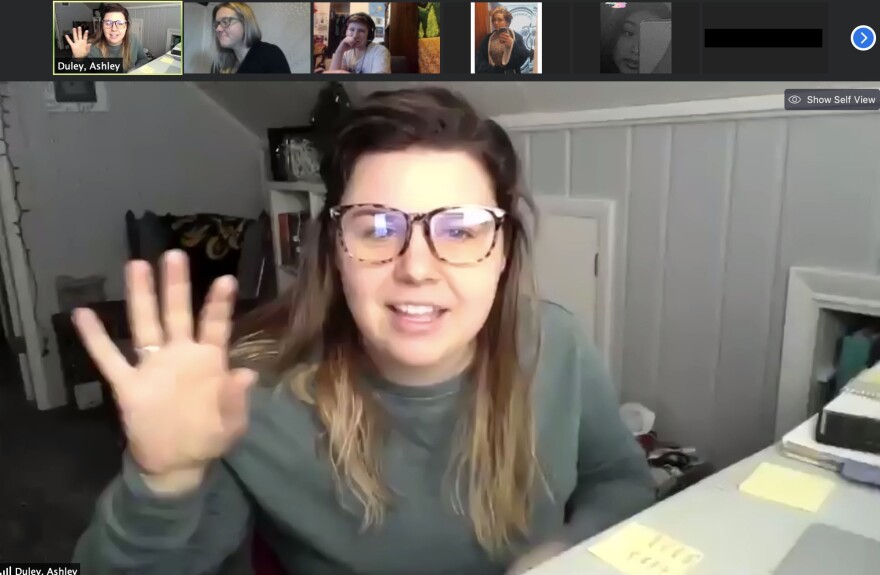As WUWM Education Reporter Emily Files visited virtual classrooms this month, she found that online school requires teachers to be intentional about how they deliver instruction, but also about how they connect with students.
Ashley Duley, an eighth grade English teacher at West Milwaukee Intermediate School, says she’ll carry those lessons with her, when life and school get back to normal.
Virtual teaching has reinforced for her that it’s OK to take time to just chat with students. On a recent Friday, she talked about old TV shows with her third period eighth graders.

“I loved PBS as a kid,” Duley says. “Like 'Cyberchase' or 'Dragon Tales'?”
Some of the students enthusiastically say they love "Dragon Tales", and one of them starts singing the theme song.
Duley also spends some time each Friday checking in with students about how they’re feeling personally and school-wise. She blends lighter and more serious questions, including how they’re doing on the Holocaust-related books they’re reading for her class.
“First question, what was something that made you smile this week?” Duley asks. “What was something that made you frustrated this week? How are your Holocaust books going, and how can we help you be more successful?”
The students use a website called Flipgrid to record videos of themselves responding, which they send to Duley. This is the only way she sees some of the students’ faces, because most keep their cameras off during class.
“Hello, um, something that made me smile this week was when I got all my work turned in,” a student named Josiah says in his Flipgrid video, which shows him in a dark room wrapped in a blanket.
“My Holocaust book is going alright. I think I’m actually falling behind,” Josiah continues. “I need to learn how to read faster and not get distracted when I’m reading because being at home could be a distraction. Something you guys could help me do? I mean it’s not really you guys, it’s like my problem.”
Duley values these check-ins so much that she plans to continue doing something like this when she’s back in school in-person.
“I would always be so concerned about OK the bell rang, time to start, instead of, the bell rang, let’s talk for five minutes,” Duley says. “So I think that’s something that has changed, and something I want to incorporate when we go back in-person is taking that time, slow down. It’s five minutes. You’re building a strong relationship so that when you do get to the work, they’re more invested.”
When Duley gets to the academic work in the virtual classroom, it’s more difficult to get students talking. During one recent lesson, she asked students to analyze a passage they listened to from the book “Refugee” by Alan Gratz.

“What were some things you guys highlighted, either characteristics or descriptive traits?”
There are several seconds of silence. In a classroom, there might be a discussion. But here, students mainly respond in the chat box.
Duley is understanding about this. She knows that students have things going on at home that sometimes make it hard to focus. And, all the screen time is tiring.
“They’re on Zoom from 7:30 a.m. to 3 p.m. with just a little lunch break,” Duley says. “So I just think a lot of kids are getting that Zoom fatigue.”
Some of Duley’s students stayed behind one morning to answer WUWM’s questions about virtual learning. They kept returning to the differences in the social aspects of school. A student named Raymond is glad he doesn’t have to deal with bullying.
“It just like released some of that anxiety and stress because I don’t have to look in other people’s faces,” Raymond says. “I don’t get bullied anymore. It’s better.”
Duley asks the students a question: “How do you think virtual learning has prepared you for high school?”
The students say learning from home isn’t preparing them for the social situations they’ll encounter in high school.
“In high school, you’re gonna be walking through hallways, you’re gonna be dealing with drama,” a student named Logan says. “You’re not dealing with as much drama [in virtual school] so you’re less adapted to it.”
Later, Duley says she was hoping they would think about that question in a different way.
“I was thinking more of the, they’re learning to be more responsible ... they’re learning to be more independent and in charge of their learning, they’re learning skills of resiliency,” Duley says. “They’re learning all these other skills they don’t always get to learn in middle school or in school in general.”
But she says, the eighth graders have a point. Everyone will need to reacclimate to the social environment when they’re back in school in-person.
Have a question about education you'd like WUWM's Emily Files to dig into? Submit it below.
_






